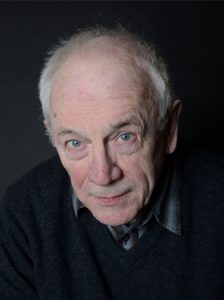
In 1957 Alan Garner was looking for somewhere isolated, landlocked; a place where he could discover whether he was a writer. He was living uncomfortably with his parents. He wanted to stay close to his roots, so he would cycle looking for empty houses to rent within five miles of Alderley. Mondays were best because Mondays were wash days, and if he saw washing on the line he knew that the house was occupied.
But, as in all folk tales, when he broke the rules on this particular day, something magical happened.
He was two miles outside his limit when he saw a piece of hardboard in a hedge. 17TH CENTURY COTTAGE FOR SALE. He followed a path down into a valley and began to climb up the opposite field.
The ridge of a tin roof appeared, with three chimneys: one at each gable end, and the third offset. With every step the building rose up to reveal itself. It wasn’t a 17th century cottage; it was a mediaeval timber frame hall that had been divided into two cottages. One was for sale. He had found his place, but he had no money to buy it.
This is how he remembers what happened.
I got home as my father was about to leave for the evening.
“And what’s up with you?” he said.
“I’ve seen the only place I can live.”
“And where’s that, then?”
“Blackden.”
My father pursed his lips and breathed in. “That’s a way.” The Garners have sat on the same square mile of Alderley since at least 1592. “Is it for renting?”
“Buying.”
“How much?”
“£510.”
“How much have you got?”
“Eight and thruppence.”
My father put on his cap and left. He was back within the hour.
“How much did you say?”
“£510.”
“You’ve got it.”
He then revealed that since my birth he had been paying a penny a week for me to be a member of The Independent Order of Oddfellows. And he knew that the local Lodge Secretary would be propping up the bar at the Union Club. As my father told it, the conversation went as follows.
“Our Alan needs £510 pounds for a house.”
“Then he’d best have it. And I’ll have a pint of bitter.”
Alan was 21 years old with a 100% mortgage, and no prospects; owner of an acre of garden and part of a rural slum with no electricity, no running water, no drains.
Alan was right; it is the only place he can live. We now know that he is a writer. But he is also a historian, and an archaeologist. His interaction with his acre of land has been profound.
